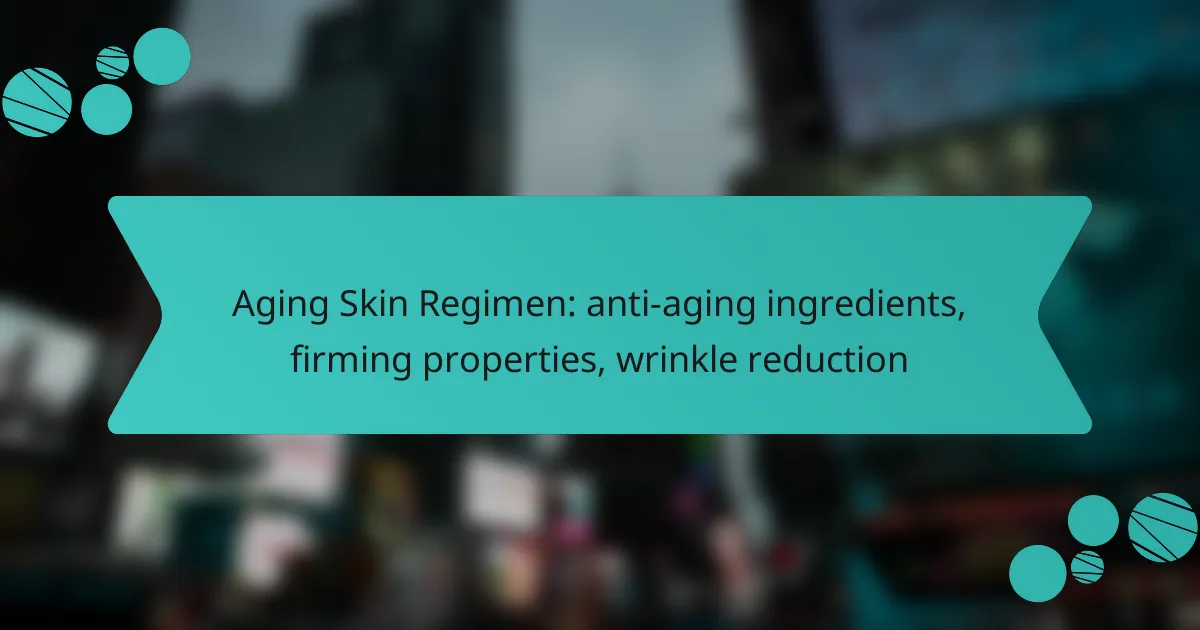Aging skin requires a thoughtful regimen that incorporates powerful anti-aging ingredients such as retinol, hyaluronic acid, and vitamin C to enhance texture and reduce wrinkles. Firming properties are essential for improving skin resilience and minimizing sagging, contributing to a more youthful appearance. Various methods for wrinkle reduction, including topical treatments and advanced therapies, offer tailored solutions for different skin types and concerns.

What are the best anti-aging ingredients for skin care?
The best anti-aging ingredients for skin care include retinol, hyaluronic acid, vitamin C, peptides, and niacinamide. These components help improve skin texture, reduce wrinkles, and promote a firmer appearance.
Retinol
Retinol, a derivative of vitamin A, is renowned for its ability to accelerate cell turnover and stimulate collagen production. This ingredient can significantly reduce the appearance of fine lines and wrinkles over time.
When using retinol, start with a low concentration to minimize irritation, gradually increasing as your skin adjusts. Apply it at night, as it can increase sun sensitivity, and always follow with sunscreen during the day.
Hyaluronic Acid
Hyaluronic acid is a powerful humectant that draws moisture into the skin, helping to maintain hydration and plumpness. This ingredient can improve skin elasticity and reduce the visibility of fine lines.
Look for serums or creams with a concentration of 1-2% for effective hydration. It’s suitable for all skin types and can be layered under other products for enhanced moisture retention.
Vitamin C
Vitamin C is a potent antioxidant that helps protect the skin from environmental damage while promoting collagen synthesis. It can brighten the complexion and reduce the appearance of dark spots and uneven skin tone.
Choose a stable form of vitamin C, such as ascorbic acid, with a concentration of 10-20%. Apply it in the morning for maximum protection against free radicals and follow with sunscreen for added defense.
Peptides
Peptides are short chains of amino acids that signal the skin to produce more collagen and elastin, which are essential for maintaining skin firmness and elasticity. They can help reduce the depth of wrinkles and improve overall texture.
Incorporate peptide-infused creams or serums into your routine, ideally after cleansing and before heavier moisturizers. Look for products containing various peptides for a synergistic effect.
Niacinamide
Niacinamide, or vitamin B3, is known for its anti-inflammatory properties and ability to improve skin barrier function. It can help reduce redness, minimize pores, and enhance skin texture.
Use niacinamide in concentrations of 2-10% for optimal results. It can be applied both morning and night and pairs well with other ingredients, making it a versatile addition to any skincare regimen.

How do firming properties affect aging skin?
Firming properties play a crucial role in improving the appearance of aging skin by enhancing its structure and resilience. These properties help reduce sagging, improve texture, and diminish the visibility of wrinkles, leading to a more youthful look.
Improved elasticity
Improved elasticity is vital for maintaining skin’s firmness as it ages. Ingredients that promote elasticity, such as peptides and elastin, help the skin bounce back from stretching or sagging. Regular use of products containing these components can lead to visibly tighter skin over time.
To maximize elasticity, consider incorporating serums or creams with these ingredients into your daily regimen. Look for products that specify their elasticity-boosting capabilities, and apply them consistently for best results.
Enhanced hydration
Enhanced hydration is essential for firming aging skin, as dry skin can exacerbate the appearance of fine lines and wrinkles. Ingredients like hyaluronic acid and glycerin draw moisture into the skin, providing a plump and supple appearance. Well-hydrated skin also supports the skin barrier, making it more resilient against environmental stressors.
To improve hydration, use moisturizers that contain these hydrating agents, especially after cleansing. Aim for products that offer long-lasting moisture to keep your skin looking fresh throughout the day.
Increased collagen production
Increased collagen production is a key factor in achieving firmer skin, as collagen provides structural support. Ingredients like retinoids and vitamin C are known to stimulate collagen synthesis, helping to reduce the appearance of wrinkles and fine lines. Over time, this can lead to a more youthful and vibrant complexion.
For effective collagen stimulation, incorporate retinol-based products into your nighttime routine and vitamin C serums during the day. Consistency is crucial, so follow a regular application schedule to see noticeable improvements in skin firmness.

What are effective methods for wrinkle reduction?
Effective methods for wrinkle reduction include topical treatments, injectables like Botox, and laser therapy. Each method has unique mechanisms and considerations, allowing individuals to choose based on their skin type and desired results.
Topical treatments
Topical treatments often feature active ingredients such as retinoids, hyaluronic acid, and peptides, which help to stimulate collagen production and improve skin texture. Regular application can lead to noticeable improvements in fine lines and overall skin firmness.
When selecting a product, look for formulations that contain proven anti-aging ingredients. A good regimen might include a retinoid at night and a moisturizer with hyaluronic acid during the day. Always perform a patch test to avoid adverse reactions.
Injectables like Botox
Injectables like Botox work by temporarily paralyzing the muscles that cause wrinkles, particularly around the forehead and eyes. This treatment can provide quick results, often visible within a few days, and typically lasts for several months.
Consult with a licensed practitioner to discuss your goals and any potential side effects. It’s advisable to start with a conservative approach and adjust dosages as needed to achieve a natural look without an overdone appearance.
Laser therapy
Laser therapy utilizes focused light to target deeper layers of skin, promoting collagen production and reducing the appearance of wrinkles. Various types of lasers are available, including ablative and non-ablative options, each with different recovery times and effectiveness.
Before undergoing laser treatment, consider factors such as skin type and desired outcomes. It’s essential to consult with a qualified dermatologist to determine the best laser type for your needs and to understand the expected downtime and aftercare required for optimal results.

What is the role of lifestyle in skin aging?
Lifestyle choices significantly influence skin aging, affecting its elasticity, hydration, and overall appearance. Factors such as hydration, diet, and sun exposure play crucial roles in maintaining youthful skin and minimizing wrinkles.
Importance of hydration
Hydration is vital for maintaining skin elasticity and preventing dryness, which can lead to the formation of fine lines and wrinkles. Drinking sufficient water daily—typically around 2 to 3 liters for most adults—can help keep the skin plump and resilient.
In addition to drinking water, using moisturizers that contain humectants like glycerin or hyaluronic acid can enhance skin hydration. These ingredients attract moisture to the skin, providing a smoother appearance and reducing the visibility of wrinkles.
Impact of diet
A balanced diet rich in antioxidants, vitamins, and healthy fats can significantly impact skin health and aging. Foods high in vitamins C and E, such as citrus fruits and nuts, help protect the skin from oxidative stress and promote collagen production.
Incorporating omega-3 fatty acids found in fish, flaxseeds, and walnuts can also improve skin barrier function and hydration. Limiting processed foods and sugars can help reduce inflammation, which is linked to premature aging.
Effects of sun exposure
Sun exposure is one of the leading causes of skin aging, contributing to wrinkles, sunspots, and loss of elasticity. Ultraviolet (UV) rays can damage collagen and elastin fibers, accelerating the aging process.
To protect the skin, it is essential to use broad-spectrum sunscreen with an SPF of at least 30 daily, even on cloudy days. Wearing protective clothing and seeking shade during peak sun hours can further reduce the risk of sun damage and maintain youthful skin.

How to choose the right anti-aging products?
Selecting the right anti-aging products involves understanding your skin type, the compatibility of ingredients, and the reputation of brands. By focusing on these factors, you can effectively target signs of aging such as wrinkles and loss of firmness.
Skin type considerations
Your skin type plays a crucial role in determining which anti-aging products will be effective. For instance, those with oily skin may benefit from lightweight, oil-free formulations, while individuals with dry skin should look for products rich in moisturizers and emollients.
Additionally, sensitive skin types should seek out hypoallergenic products with soothing ingredients like aloe vera or chamomile. Conducting a patch test before fully incorporating a new product can help prevent adverse reactions.
Ingredient compatibility
Understanding ingredient compatibility is essential for maximizing the effectiveness of your anti-aging regimen. Some powerful ingredients include retinoids, hyaluronic acid, and peptides, which work together to improve skin texture and reduce wrinkles.
Avoid combining potent actives like retinol with exfoliating acids, as this can lead to irritation. Instead, consider using them on alternate days or at different times of the day to maintain skin health.
Brand reputation
Choosing products from reputable brands can significantly impact the effectiveness and safety of your anti-aging routine. Look for brands that prioritize clinical testing and transparency regarding their ingredient sourcing.
Reading customer reviews and checking for certifications, such as cruelty-free or dermatologically tested, can also guide your decision. Established brands often have a history of reliable formulations that deliver results.

What are the latest trends in anti-aging skin care?
The latest trends in anti-aging skin care focus on innovative ingredients and formulations that enhance skin firmness and reduce wrinkles. Consumers are increasingly seeking products that deliver visible results through scientifically-backed components.
Anti-aging ingredients
Key anti-aging ingredients include retinoids, peptides, hyaluronic acid, and antioxidants like vitamin C. Retinoids promote cell turnover, while peptides help stimulate collagen production, leading to firmer skin. Hyaluronic acid hydrates and plumps the skin, reducing the appearance of fine lines.
When selecting products, look for formulations that combine these ingredients for synergistic effects. For instance, a serum containing both retinoids and hyaluronic acid can provide both anti-aging and moisturizing benefits, making it a versatile addition to your regimen.
Firming properties
Firming properties in skin care products often come from ingredients that boost collagen and elastin production. Formulations with peptides and growth factors can improve skin elasticity and firmness over time. Regular use of these products can lead to a more youthful appearance.
Consider incorporating firming creams or serums into your daily routine, especially those designed for nighttime use when skin repair is most active. Look for products that mention clinical studies or consumer satisfaction to ensure effectiveness.
Wrinkle reduction
Wrinkle reduction strategies focus on both prevention and treatment. Daily sunscreen application is crucial, as UV exposure accelerates skin aging. Additionally, products containing retinoids or alpha hydroxy acids can help diminish existing wrinkles by promoting skin renewal.
For optimal results, combine topical treatments with lifestyle changes such as a balanced diet rich in antioxidants and adequate hydration. Regular facial massages can also enhance circulation and improve skin texture, contributing to a smoother appearance.
